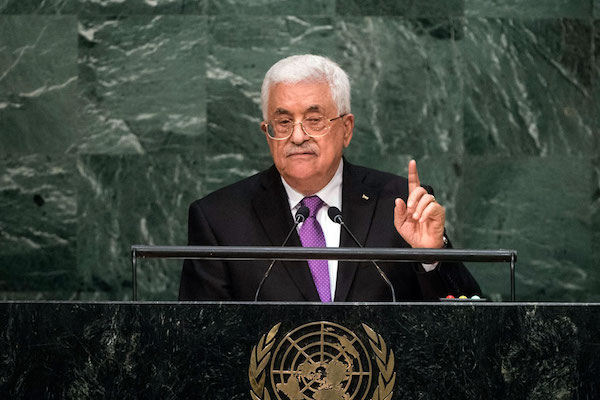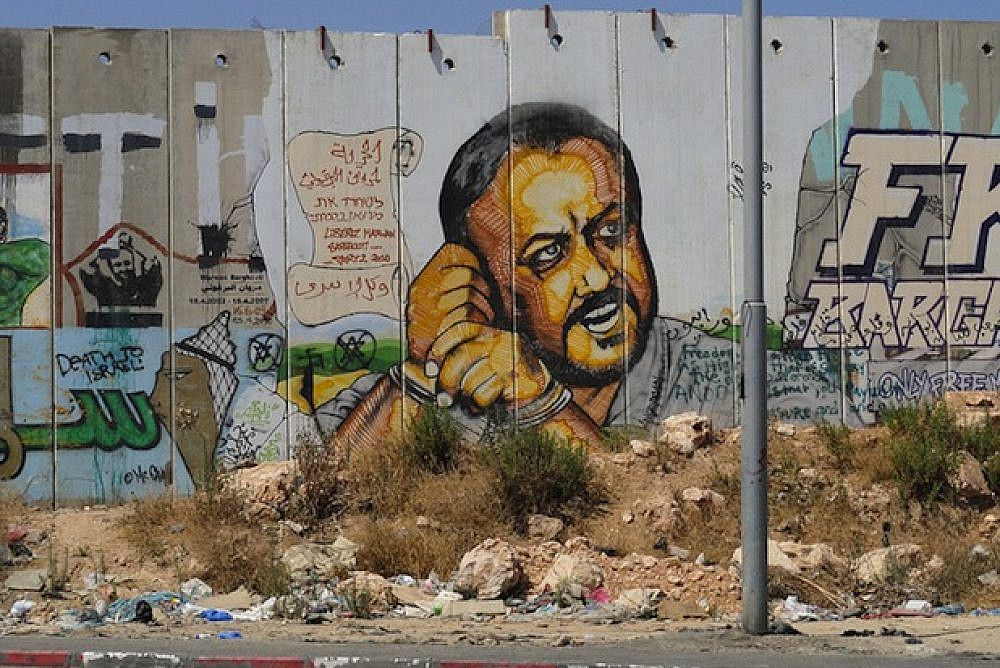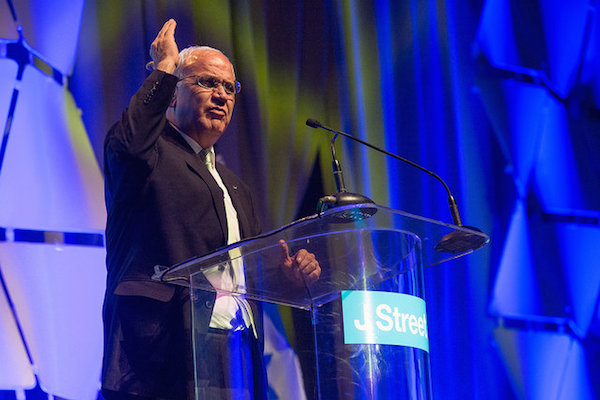Until recently Palestinian President Mahmoud Abbas was considered only a lame duck. Long ago he had promised not to run for president in the next elections. Not a single politician threatened him, he did not appoint a vice president, and elections never took place. But over the past two weeks Abbas has gone from lame duck to politically handicapped.
At end of last month Palestinian prisoner Marwan Barghouti announced that he would vie to succeed Abbas. This was not a declaration of purpose for the unforeseen future. Barghouti also published a strategic document that publicly challenges Abbas, here and now. Barghouti is currently serving five life sentences in Israeli prison after being convicted of direct involvement in four terror attacks during the Second Intifada, which killed four people.
Negotiations with Israel and political initiatives at the UN and the International Criminal Court — the flagship of Abbas’ tenure — have failed completely, Barghouti writes in his manifesto. “This is a pathetic policy disconnected from the reality on the ground,” nothing more than self-delusion. Few Palestinians, if any, disagree. According to polls by Dr. Khalil Shikaki, probably the most prominent Palestinian pollster, two-thirds of the public demand Abbas step down. However, until now, no one has proposed an alternative the way Barghouti has. The crown jewel of the declaration is the call for a widespread, popular intifada. Abbas has rejected proposals for a non-violent intifada several times in the past. Now it is being presented in new garb.
The Individuals Intifada, Barghouti believes, lacks a goal and a framework. It must subside, along with the political and organizational vacuum created by Abbas. In order to build the next intifada on strong foundations, Barghouti suggests changing the Palestinian discourse from one of agreements to one of liberation, while changing the manner in which the Palestinian Authority functions. The PA must put an end to security coordination with Israel, and instead of acting as the middleman between the occupier and the Palestinians, it must assist the Palestinians in confronting Israel. Barghouti evades describing just how to change the PA when it is so dependent on the occupation. Israel could always put an end to the popular struggle by going after the PA.

Instead Barghouti takes aim at Abbas. He accuses him of oppressing the Palestinian public. He accuses him of corruption, weakness when facing Israel, exclusion of social groups, a one-man rule, and blocking young people from rising in the political ranks. The political deadlock has turned ISIS into a popular alternative among the youth. Barghouti does not find one single aspect of the PA’s rule that continues the path of the founders of the PLO, which were once considered among the “forces of liberation, democracy, and justice.” In order to return to that path, Barghouti seeks a total revision, “a revolution in the education system, in the way we think, in culture, and in our legal system.”
A broad front
Alongside a return to a discourse of liberation, Barghouti suggests beginning the process of national reconciliation with Hamas and establishing a full, fair partnership within the PLO and the PA. This will form the basis for presidential elections, parliamentary elections, as well as elections for the PLO’s executive committee.
Barghouti is not making due with declaring his candidacy and releasing his manifesto. He is working to establish national reconciliation and is positioning himself as the successor, even in the eyes of of the Islamic movements. This past week, Times of Israel’s Avi Issacharoff wrote that four of Barghouti’s closest confidants in Fatah reached a written agreement with the heads of Hamas and Islamic Jihad regarding a joint action plan for an unarmed popular struggle against the Israeli occupation and the establishment of a Palestinian state in the 1967 territories. These understandings do not negate negotiations with Israel, but rather create a different framework than the Oslo accords. The new leadership will declare an end to the Oslo process — including security coordination — and will rescind the PLO’s recognition of the State of Israel unless Israel recognizes the Palestinian state.
According to Issacharoff, the new Palestinian leadership under Barghouti will manage a non-violent struggle to disrupt the daily lives of settlers in the West Bank and East Jerusalem. The leadership will start functioning on the day after Abbas, although its very establishment harms Abbas’ authority and paints him as an empty vessel. While Abbas goes from meeting to meeting in capital cities the world over, works on a draft resolution to be presented to the UN Security Council to condemn — once again — Israeli settlements while setting a deadline for negotiations that haven’t even begun, and calls on France to organize an international summit to reignite negotiations, the heads of Fatah’s Tanzim have reached an agreement with Hamas over an alternative to Abbas.
It is no coincidence that Barghouti’s men took advantage of Palestinian Prisoner’s Week to talk about their leader, and even declared and international campaign for his candidacy for the Nobel Peace Prize.
Barghouti’s ability to formulate a platform and an agreement with Hamas gives him a significant advantage over other possible successors, such as Mohammed Dahlan or Jibril Rajoub, who are driven by nothing more than personal ambition, or the heads of the PA’s intelligence services, who support Abbas’ path despite widespread opposition from Palestinians. Add to that prominent Palestinian negotiator Saeb Erekat, who has thrown his support behind Barghouti. Erekat does not have popular support in the Fatah, and yet his declaration is significant; he was appointed chairman of the PLO Executive Committee, replacing Yasser Abed Rabbo, who was dismissed after Abbas suspected him of supporting Dahlan. Thus Abbas is returning the favor to Erekat for his allegiance, as well as for consistently implementing Abbas’ negotiation-based policies as the only way to end the occupation. Now Abbas has lost Erekat as well.
The competition is not only over the identity of Abbas’ successor, but also over his path. The only thing that may save Abbas’ legacy is unequivocal support by the West for the Arab Peace Initiative. The chance of that happening, however, is small. The West, and especially Obama, is uninterested in head-on collision with Israel, while losing interest and faith in the ability to bring the two sides toward compromise. The West has more urgent issues to take care of. A lackluster resolution in the Security Council will only turn out in favor of the Barghouti camp, causing Abbas to sink even deeper.
Barghouti has won the support of much of the Palestinian public, and is seen as someone who has the ability to defeat any other candidate from either Fatah or Hamas. His latest moves show that he isn’t content with being the Fatah leader who wins over his political rivals, but rather a leader accepted by all. Elections will only affirm the status he acquired — before they are even held — and all while he is still behind bars.
Barghouti’s strategy has many holes. Over the years management, implementation, and coordination have been the weak spot of Palestinian strategy. The same goes for Barghouti’s ideas; he is still in prison, and it does not seem reasonable that more confrontation with Israel will lead to his release. It looks like he is willing to wait.
This article was first published in Hebrew on Local Call. Read it here.



